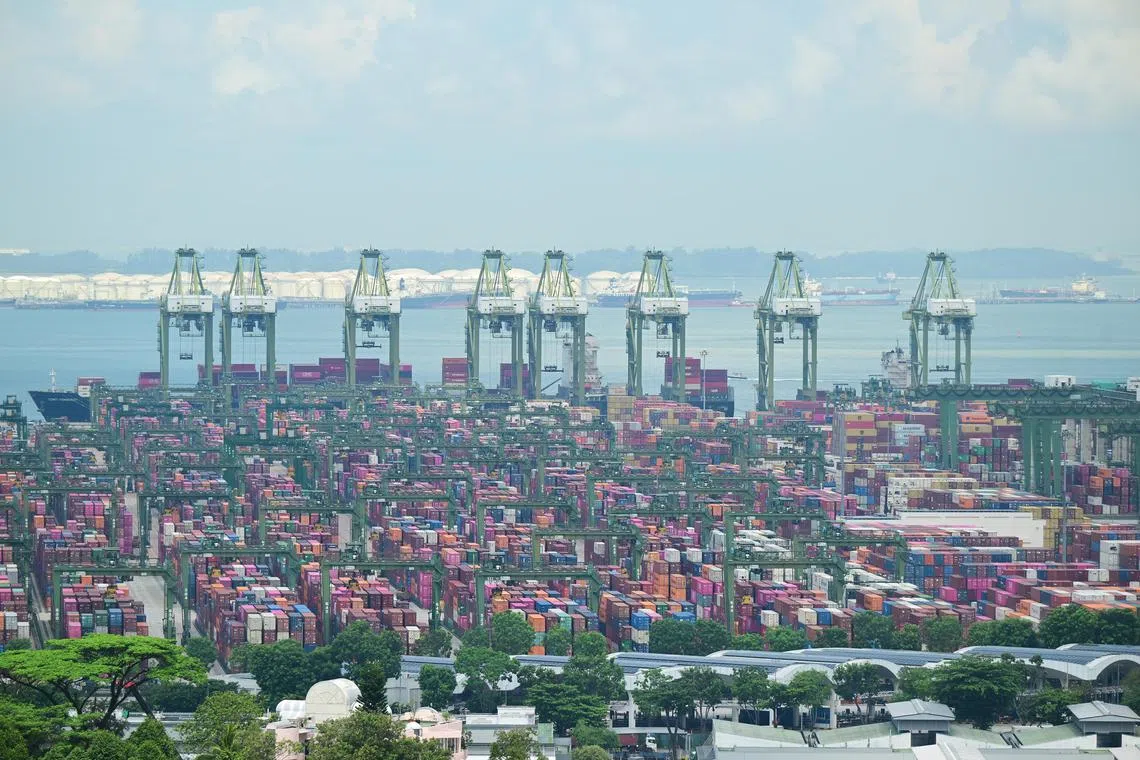Digital bunkering mandatory for bunker suppliers in Singapore from April 1, 2025
Sign up now: Get ST's newsletters delivered to your inbox

The digital bunkering process will allow efficient data sharing between bunker buyers and suppliers.
PHOTO: ST FILE
SINGAPORE – All bunker suppliers at Singapore’s port will be required to provide digital bunkering services by default from April 1, 2025, making the Republic the first country to roll out large-scale digital bunkering.
Digital bunkering is the digitalisation of refuelling processes and documentation through electronic bunker delivery notes, which eliminates paperwork and tedious manual processing.
The digital bunkering requirement will help the maritime industry save close to 40,000 man-days every year, and boost the efficiency and transparency of bunkering processes in Singapore, said Senior Minister of State for Transport Amy Khor at the biennial Singapore International Bunkering Conference and Exhibition on Oct 9.
From January to August, there was a rise in total bunker sales of approximately 7 per cent, reaching more than 36 million tonnes, compared with the same period in 2023, according to the Maritime and Port Authority of Singapore (MPA).
The digital bunkering process will allow efficient data sharing between bunker buyers and suppliers, which will speed up administrative processes and improve accountability, said MPA on Oct 9.
Data released by the MPA shows there are 41 licensed bunker suppliers in Singapore as at Aug 1.
Dr Khor noted that MPA will also introduce a centralised electronic bunker delivery note record verification facility, which can check notes against information sent to MPA to improve the transparency of bunkering transactions.
Successful digital bunkering trials have been carried out with bunker suppliers in Singapore since Nov 1, 2023.
From April 1, MPA will also reduce the frequency of verifying mass flow meters – accurate measuring devices of marine fuel for bunkering – from twice to once every year. Dr Khor said this move will streamline business processes and save the industry approximately $300,000 every year.
Other industry developments were announced at the conference, which is being held at Resorts World Sentosa from Oct 8 to 10.
From Jan 1, the MPA will push out two new artificial intelligence programs – DocuMind and DocuMatch – to improve the accuracy and efficiency of ship certificate renewals for Singapore-flagged ships. These will speed up certificate renewals from up to three days now to within a few minutes for most transactions.
On the ammonia bunkering front, there were two more shortlisted proposals for the creation of low- or zero-carbon ammonia solutions on Jurong Island.
The proposals from Mitsui and Fortescue-Equatorial Marine Fuels have been added to the existing three proposals that will be considered in the next round of evaluations, according to MPA.
On Oct 9, MPA and the Shandong Provincial Transport Department signed an agreement to establish a Singapore-Shandong green and digital shipping corridor.
Green shipping corridors are test beds for digital solutions and alternative fuels and technologies in the maritime sector between two ports.
This initiative along with the Singapore-Tianjin green and digital shipping corridor will help to support closer digital and green fuel collaboration between Singapore and the Bohai and Yellow Sea region, said MPA.
For the industry as a whole, Dr Khor noted that MPA will commit $50 million from 2025 to 2030 to support the roll-out of a refreshed Maritime Singapore Green Initiative.
This sum will cover discounts given to energy-efficient Singapore-registered ships or those equipped with zero-emission technologies calling at Singapore’s port, and provide funding for port decarbonisation projects, among others.
MPA also provided updates on the Maritime Energy Training Facility (METF),
More than 300 maritime crew members have been trained at the facility since its opening.
Twenty-nine new partners from various shipping companies, trading companies, maritime associations and institutes of higher learning have also joined the facility, raising the total number from 22 to 51 partners.
These partners, including Eastern Pacific Shipping and Singapore Institute of Technology, will work together to design METF’s training courses on future fuels and decarbonisation technologies.
Correction note: In an earlier version of the story, we said that MPA will commit $50 million from 2025 to 2027 to support the Maritime Singapore Green Initiative. MPA has since clarified that it will be applicable from 2025 to 2030.


